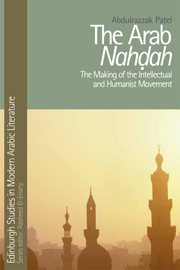Book contents
- Frontmatter
- Contents
- Series Editor's Foreword
- Acknowledgements
- Preface
- Introduction: Perspectives, Paradigms and Parameters
- 1 Contemporary Interpretations of the Nahḍah: Tradition, Modernity and the Arab Intellectual
- 2 The Reintegration of Pre-modern Christians into the Mainstream of Arabic Literature and the Creation of an Inter-religious Cultural Space
- 3 Guardians of the Pre-modern Arab-Islamic Humanist Tradition: Legends without a Legacy, a Tradition without Heirs
- 4 Language Reform and Controversy: The al-Shartūnīs Respond in Defence of the Pre-modern Humanist Tradition
- 5 Arabism, Patriotism and Ottomanism as Means to Reform
- 6 Arab Intellectuals and the West: Borrowing for the Sake of Progress
- 7 Education, Reform and Enlightened Azharīs
- 8 Enacting Reform: Local Agents, Statesmen, Missionaries and the Evolution of a Cultural Infrastructure
- Conclusion
- Bibliography
- Index
6 - Arab Intellectuals and the West: Borrowing for the Sake of Progress
Published online by Cambridge University Press: 05 October 2013
- Frontmatter
- Contents
- Series Editor's Foreword
- Acknowledgements
- Preface
- Introduction: Perspectives, Paradigms and Parameters
- 1 Contemporary Interpretations of the Nahḍah: Tradition, Modernity and the Arab Intellectual
- 2 The Reintegration of Pre-modern Christians into the Mainstream of Arabic Literature and the Creation of an Inter-religious Cultural Space
- 3 Guardians of the Pre-modern Arab-Islamic Humanist Tradition: Legends without a Legacy, a Tradition without Heirs
- 4 Language Reform and Controversy: The al-Shartūnīs Respond in Defence of the Pre-modern Humanist Tradition
- 5 Arabism, Patriotism and Ottomanism as Means to Reform
- 6 Arab Intellectuals and the West: Borrowing for the Sake of Progress
- 7 Education, Reform and Enlightened Azharīs
- 8 Enacting Reform: Local Agents, Statesmen, Missionaries and the Evolution of a Cultural Infrastructure
- Conclusion
- Bibliography
- Index
Summary
Arab thinkers were convinced that the desired renaissance of their societies required some borrowing from Europe. This chapter examines the views of key Arab intellectuals and looks at how they rationalised the importation of Western secular knowledge in order to reform their societies. The chapter argues that while Arab thinkers accepted certain ‘enlightened’ Western epistemological principles for reform, they also maintained alternative paradigms (e.g., Arabism) in order to give their identity a stable historical dimension and a moral synthesis that would enable them to modernise without losing their identity. This same tendency is furthermore discerned in translated works of the later part of the nineteenth century. Using examples from the humanist literature of the period, the chapter shows how translators were no longer content with a straightforward mechanical transposition from a foreign source, as was largely the case under Muḥammad ‘Alī. On the contrary, later translators, while borrowing from the West, sought to maintain the purity of Arabic, contributed by elaborating their own views and adapted the obtained knowledge to the framework of their own cultural values, which allowed them to benefit from non-Arab learning without compromising their identity and values.
The Case for Selective Borrowing
Arab intellectuals such as al-Bustānī, al-Ṭahṭāwī, Khayr al-Dīn and ‘Abduh believed that the desired renaissance of Arab society required some borrowing from Europe. They therefore considered the possibility and legitimacy of importing Western secular knowledge in order to modernise their societies. It is remarkable that these intellectuals adopted almost the same line of reasoning to justify the idea of borrowing from the West.
- Type
- Chapter
- Information
- The Arab NahdahThe Making of the Intellectual and Humanist Movement, pp. 159 - 180Publisher: Edinburgh University PressPrint publication year: 2013



